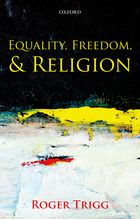Equality, Freedom, and Religion

Equality, Freedom, and Religion
Roger Trigg
Oxford University Press 2012
Publisher’s Abstract:
- Addresses a topic of great topical concern, providing lucid analysis of debates frequently aired in the media
- Written in an accessible style yet displaying a knowledge of underlying philosophical and theoretical controversies, with particular reference to law
- Suitable as an introductory text for students in law, politics, and religious studies
- Draws on illustrations from the United States, Canada, and across Europe
Is religious freedom being curtailed in pursuit of equality, and the outlawing of discrimination? Is enough effort made to accommodate those motivated by a religious conscience? All rights matter but at times the right to put religious beliefs into practice increasingly takes second place in the law of different countries to the pursuit of other social priorities. The right to freedom of belief and to manifest belief is written into all human rights charters. In the United States religious freedom is sometimes seen as ‘the first freedom’. Yet increasingly in many jurisdictions in Europe and North America, religious freedom can all too easily be ‘trumped’ by other rights. Roger Trigg looks at the assumptions that lie behind the subordination of religious liberty to other social concerns, especially the pursuit of equality. He gives examples from different Western countries of a steady erosion of freedom of religion. The protection of freedom of worship is often seen as sufficient, and religious practices are separated from the beliefs which inspire them. So far from religion in general, and Christianity in particular, providing a foundation for our beliefs in human dignity and human rights, religion is all too often seen as threat and a source of conflict, to be controlled at all costs. The challenge is whether any freedom can preserved for long, if the basic human right to freedom of religious belief and practice is dismissed as of little account, with no attempt to provide any reasonable accommodation. Given the central role of religion in human life, unnecessary limitations on its expression are attacks on human freedom itself. Readership: General readers interested in religion in society. Students and scholars of religion and public life; of human rights legislation; of the sociology of religion.